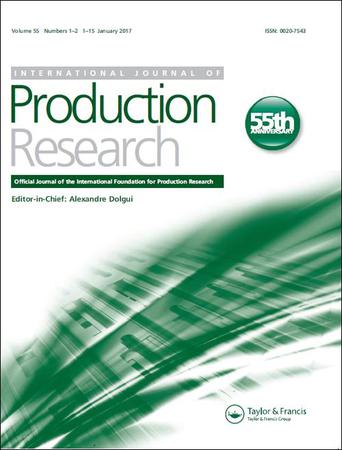Deep reinforcement learning approach for dynamic capacity planning in decentralised regenerative medicine supply chains
IF 7.3
2区 工程技术
Q1 ENGINEERING, INDUSTRIAL
International Journal of Production Research
Pub Date : 2023-09-26
DOI:10.1080/00207543.2023.2262043
引用次数: 0
Abstract
AbstractDecentralized manufacturing has the benefits of fast fulfillment, reducing risks of distant delivery, and improving patient access to personalised regenerative medicine (PRM). Implementing the decentralised PRM manufacturing system successfully needs a capacity planning strategy involving inventory replenishment, capacity allocation, and demand sharing to mitigate the impacts of supplier disruption and satisfy demand with a high service level. However, existing methods for generating optimal capacity planning policies for such PRM systems require knowing the distributions of the supplier disruption and demand uncertainty, which is usually unknown for PRM supply chains. This study proposes a data-driven approach that can learn effective capacity planning policy under various manufacturing circumstances without knowing the exact distributions. The proposed approach utilises a production simulation model and a deep reinforcement learning method. Case study results demonstrate that the proposed method can outperform existing methods when ground-truth demand forecasts differ from priori estimations. The results also support that the proposed method not only can be applied in regenerative medicine but also in many other sectors.Keywords: Regenerative medicinedecentralised manufacturing systemreinforcement learningdynamic capacity planningsupply disruptiondemand uncertainty Disclosure statementNo potential conflict of interest was reported by the author(s).Data availability statementThe data that support the findings of this study are available from the corresponding author, C.-Y. Tseng, upon reasonable request.Additional informationFundingThe authors acknowledge that the research was supported by the BioFabUSA of Advanced Regenerative Manufacturing Institute [grant number T0171]. In addition, the simulation environment developed in this study is based on the concept depicted in work supported by the National Science Foundation [grant number EEC-1648035].Notes on contributorsChin-Yuan TsengChin-Yuan Tseng received his Ph.D. in Industrial Engineering with a specialisation in System Informatics and Control and a minor in Machine Learning from the Georgia Institute of Technology in 2023. His research focuses on simulation and AI for production systems and supply chain integration.Junxuan LiJunxuan Li is a senior scientist lead at Microsoft Business Emerging Technology, applying state-of-art Operation Research (OR) and Large Language Models (LLM) methodologies to business applications, e.g., ERP and CRM systems. Junxuan received his Ph.D. in Operations Research from Georgia Tech with a minor in AI, concentrating on sequential decision-making and dynamic control. The main application areas include smart supply chains, intelligent manufacturing, intelligent healthcare, field services, transportation, and e-commerce.Li-Hsiang LinLi-Hsiang Lin serves as an Assistant Professor in the Department of Mathematics and Statistics at Georgia State University. He earned his Ph.D. in Industrial Engineering with a specialisation in Statistics and a minor in Machine Learning from the Georgia Institute of Technology in 2020. His research focuses on various areas, including computer experiment modelling, nonparametric regression techniques, and the development of innovative methodologies for applications in engineering.Kan WangKan Wang is a Senior Research Engineer at the Georgia Tech Manufacturing Institute (GTMI) and leads the Advanced Manufacturing for BioEngineering Research (AMBER) laboratory. His research focuses on tissue engineering, biosensors, and biomanufacturing supply chain simulation. Dr. Wang earned his B.S. in Theoretical and Applied Mechanics from Peking University, M.S. in Aircraft Design from Beihang University, and Ph.D. in Industrial and Manufacturing Engineering from Florida State University. Since completing his Ph.D. degree in 2013, he has authored over 80 refereed journal papers and 4 book chapters. Dr. Wang's work continues to drive innovation at the intersection of advanced manufacturing and bioengineering.Chelsea C. White IIIChelsea C. White III Professor White holds the Schneider National Chair of Transportation and Logistics at Georgia Tech. His most recent research interests include analysing the role and value of real-time information for stress testing supply chains to improve next-generation manufacturing supply chain competitiveness, risk reduction, and for healthcare related supply chains, patient benefit. He is a Fellow of the IEEE, a Fellow of INFORMS, and an INFORMS Edelman Laureate. He is a former member of the board of directors of the Fortune 500 company Con-way, Inc. (NYSE: CNW, 2004–2015) and of the World Economic Forum Trade Facilitation Council.Ben WangBen Wang is a Professor Emeritus at the Georgia Institute of Technology (GT). He was the Executive Director of Georgia Tech Manufacturing Institute from 2012 to 2022. His professional focus is strengthening manufacturing competitiveness through technology, infrastructure, workforce, and policy. From 2017 to 2019, he served as Chair of the National Materials and Manufacturing Board of the National Academies of Sciences, Engineering, and Medicine. In addition to authoring or co-authoring more than 280 refereed journal papers, he co-authored three books. He is involved in two startups in 3D printing.分布式再生医药供应链动态容量规划的深度强化学习方法
【摘要】分散式生产具有快速实现、降低远程交付风险和改善患者获得个性化再生医学(PRM)的机会等优点。成功实施分散式PRM制造系统需要一个包括库存补充、产能分配和需求共享的产能规划策略,以减轻供应商中断的影响,并以高服务水平满足需求。然而,现有的为此类PRM系统生成最优产能规划策略的方法需要知道供应商中断和需求不确定性的分布,这对于PRM供应链通常是未知的。本研究提出了一种数据驱动的方法,可以在不知道确切分布的情况下学习各种制造环境下有效的产能规划策略。该方法利用生产仿真模型和深度强化学习方法。实例研究结果表明,当真实需求预测与先验估计存在差异时,该方法优于现有方法。结果表明,该方法不仅可以应用于再生医学,还可以应用于许多其他领域。关键词:再生医学分散制造系统强化学习动态产能规划供应中断需求不确定性披露声明作者未报告潜在利益冲突。数据可用性声明支持本研究结果的数据来自通讯作者c - y。应合理要求。作者承认这项研究得到了先进再生制造研究所BioFabUSA的支持[授权号T0171]。此外,本研究中开发的模拟环境是基于美国国家科学基金会[资助号EEC-1648035]支持的工作中描述的概念。作者简介chin - yuan Tseng chin - yuan Tseng于2023年获得佐治亚理工学院工业工程博士学位,主修系统信息与控制,辅修机器学习。他的研究重点是生产系统和供应链集成的仿真和人工智能。李俊轩是微软商业新兴技术部门的高级科学家,负责将最先进的运筹学(OR)和大型语言模型(LLM)方法应用于商业应用,如ERP和CRM系统。他在佐治亚理工学院获得运筹学博士学位,辅修人工智能,主要研究顺序决策和动态控制。主要应用领域包括智能供应链、智能制造、智能医疗、现场服务、交通运输、电子商务等。林立祥,美国佐治亚州立大学数学与统计学系助理教授。他于2020年在佐治亚理工学院获得工业工程博士学位,主修统计学,辅修机器学习。他的研究集中在多个领域,包括计算机实验建模,非参数回归技术,以及工程应用创新方法的发展。王侃是佐治亚理工学院制造研究所(GTMI)的高级研究工程师,领导生物工程研究先进制造(AMBER)实验室。主要研究方向为组织工程、生物传感器、生物制造供应链模拟。他持有北京大学理论与应用力学学士学位,北京航空航天大学飞机设计硕士学位,佛罗里达州立大学工业与制造工程博士学位。自2013年获得博士学位以来,他撰写了80多篇期刊论文和4个书籍章节。他的工作继续推动先进制造和生物工程交叉领域的创新。White教授是佐治亚理工学院运输和物流施耐德国家主席。他最近的研究兴趣包括分析压力测试供应链实时信息的作用和价值,以提高下一代制造业供应链的竞争力,降低风险,以及医疗保健相关供应链,患者利益。他是IEEE会员,INFORMS会员,INFORMS爱德曼奖得主。他是财富500强公司康威公司(纽约证券交易所代码:CNW, 2004-2015)和世界经济论坛贸易便利化委员会的前董事会成员。本·王是佐治亚理工学院(GT)名誉教授。2012年至2022年,他担任乔治亚理工制造研究所的执行董事。
本文章由计算机程序翻译,如有差异,请以英文原文为准。
求助全文
约1分钟内获得全文
求助全文
来源期刊

International Journal of Production Research
管理科学-工程:工业
CiteScore
19.20
自引率
14.10%
发文量
318
审稿时长
6.3 months
期刊介绍:
The International Journal of Production Research (IJPR), published since 1961, is a well-established, highly successful and leading journal reporting manufacturing, production and operations management research.
IJPR is published 24 times a year and includes papers on innovation management, design of products, manufacturing processes, production and logistics systems. Production economics, the essential behaviour of production resources and systems as well as the complex decision problems that arise in design, management and control of production and logistics systems are considered.
IJPR is a journal for researchers and professors in mechanical engineering, industrial and systems engineering, operations research and management science, and business. It is also an informative reference for industrial managers looking to improve the efficiency and effectiveness of their production systems.
 求助内容:
求助内容: 应助结果提醒方式:
应助结果提醒方式:


